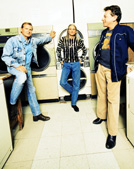 |

Comment
on this story
What:
Sundown in the City: The Flatlanders with Reckless Kelly
When:
Thursday, May 13, 6 p.m.
Where:
Market Square, downtown
Cost:
Free
|
Where They’re At
The Flatlanders’ 30-year-old music is suddenly fashionable
by Joe Tarr
When they got together as The Flatlanders back in the early ’70s, they never really thought about becoming country music stars. Their names were Jimmie Dale Gilmore, Butch Hancock, and Joe Ely—today three celebrated songwriters, but back then they were just nobodies with guitars.
Jimmie and Butch had known each other in high school. Joe Ely met Jimmie in Lubbock, Texas, and soon all three were fast friends. “We all just hit it off and got a house together,” Ely says in a phone interview. “The Flatlanders started from that house when we sat around and played all the time. We played very few paying gigs. Probably the entire time The Flatlanders were together, we made that one record and played maybe 15 shows. Most of the time it was sitting around the house playing.”
Released only on 8-track tape in 1973, that first album tanked, and the three young songwriters pursued separate music careers. Each went on to moderate commercial success and glowing critical praise.
And the album they recorded together became legendary. A British bootleg of it was released in the ’80s with the title One More Road, and then it was released on CD in the ’90s as More a Legend Than a Band.
They remained close friends, but never recorded together until Ely was working on a song for the Horse Whisperer soundtrack, the Robert Redford movie. “I got a call from Redford’s camp and they said, ‘You used to be with The Flatlanders.’ I said, ‘We see each other all the time, but we never have written together.’ I thought it would be interesting, so I called Butch and Jimmie up and within a few days we were sitting down together. We wrote that song for the soundtrack and then we kept writing together.”
The sessions led to The Flatlanders’ second LP, 2002’s Now Again. They followed it up this year with Wheels of Fortune.
In the years since they first met, all three have developed strong cult followings. Ely says their process for writing together is a little different than when they’re writing alone.
“Butch made the observation that even when you’re writing a song, there’s two people inside you. One is editing your other self. As you write a line, you’re already critiquing yourself, saying ‘That’s a crock of shit’ and you start over. The three of us writing together is like six people writing a song.”
“We sort of knew when things were right when we wrote one line at a time, one note at a time,” he adds.
All three of The Flatlanders had to pay their dues in order to find commercial success. Joe Ely made several highly regarded records, but he was relatively unknown until The Clash—who were big fans, especially of Ely’s Honky Tonk Masquerade—took him on their London Calling tour and invited him to contribute on Combat Rock. “We played some really wild shows. They were at the top of their career and were just massively huge in England,” Ely says. “They were huge rockabilly fans, especially Joe [Strummer]... It was real sad to see him go because he was a real vital person, full of life and energy, the kind of guy you’d never think is going to die.”
Today all three Flatlanders find themselves godfathers of the Americana genre, something Ely finds a bit baffling.
“Sometimes it almost seems like a fashion. It’s become a change in blue jeans or something. A lot of times I can’t really relate to it because people are writing songs almost so they can fit into that certain category. I’m so sick of hearing these songs with the word ‘Texas’ in it and ‘Austin.’ It’s like, ‘C’mon—write about something that’s meaningful instead of some cliché,’” Ely says.
“But at the same time, it’s produced a lot of great material. With any genre, I guess you have to weed through the bad to get to the good.”
Ely says Hancock, Gilmore and he are as good of friends as they’ve always been—they spent the day riding bikes around Kansas City, where they’d played a gig the night before—but he doesn’t foresee any more Flatlanders albums. (A set of demos from the early years was recently found and might be released soon, says Ely, adding that the sound quality is really good.)
“We really didn’t plan on doing more than one record. We’re not going to turn into a bar band that tours the country forever. This will probably be the last time we go out together,” Ely says.
“It’s funny how things work because we never set out to make records or become known. We had no idea what was going to happen,” Ely says. “For us, writing music all through our lives has been like keeping a journal of where we are, what we’ve done. We write stuff just because it’s kind of part of our lives. Each record you look at and say, ‘Oh, yeah, that’s where I was at.’”

May 13, 2004 • Vol. 14, No. 20
© 2004 Metro Pulse
|
|